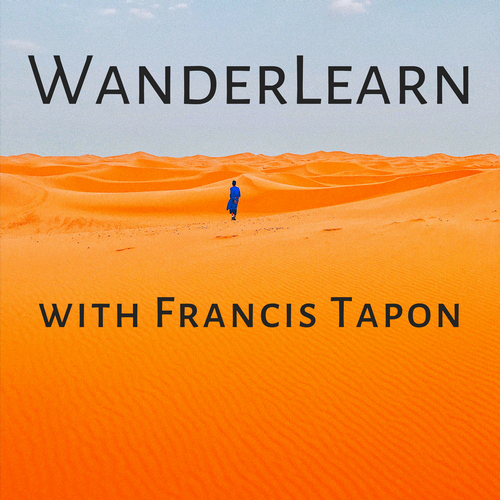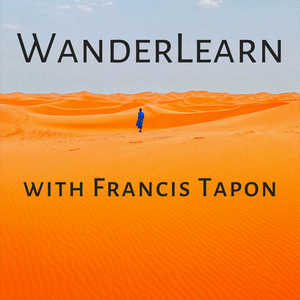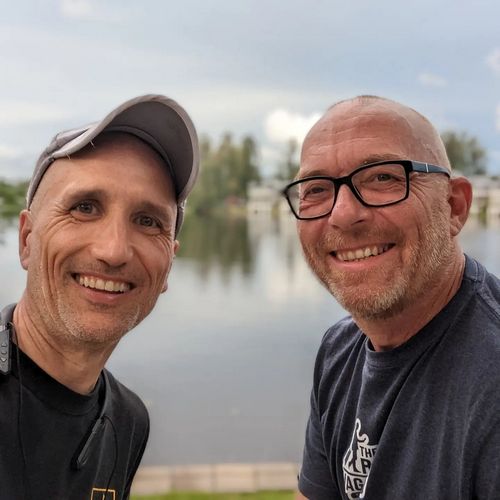WanderLearn Podcast

Check out the latest WanderLearn episodes!
Take a profound and distant journey. Call it:
- Deep Travel
- Immersive Travel
- Slow Travel
- Vagabonding
I will guide you to the intersection of travel, technology, and transformation.
The WanderLearn podcast will compel you to go beyond your comfort zone.
I wander all over the world and I share what I learn with you! In so doing, I hope you'll be inspired to do the same. Travel is the best university.
How to Subscribe to the WanderLearn Podcast
Search for "WanderLearn" in your favorite podcast player.
 If that fails:
If that fails:
This email address is being protected from spambots. You need JavaScript enabled to view it. the details of the podcast player that failed to find the show.- While I fix the problem, copy and paste this feed into your favorite podcast player:
https://wanderlearn.com/feed.xml
Although subscribing is essential, two other things help the WanderLearn podcast:
- Download every WanderLearn episode as I produce them! That's what helps get it noticed! It's better to have 100 subscribers and 100,000 downloads per episode than 10,000 subscribers and 100 downloads.
- Share the episodes! Word of mouth is gold!
Get My Infrequent Newsletter!
Don't just listen, watch!
Some WanderLearn episodes will also be videos, so be sure to subscribe to my YouTube Channel too.
I welcome comments and questions for each episode, which are listed below, from the most recent to the first one. I promise to answer any question from one of my Patrons. That's just one way to get rewarded for supporting the show!
Listen to the latest episodes below!
The show notes and comments for each episode are below

Learn about the benefits of meditating while you travel. Kateri Anderson Heymans also describes the Isha Judd meditation system.
Kateri mentions the book Why Walk When You Can Fly?: Soar Beyond Your Fears and Love Yourself and Others Unconditionally.
Timeline
00:00 Getting into meditation
03:10 Isha Judd
06:20 Mechanics of meditation
09:30 Learn more
Video
Podcast

Pamela Morgan, author of Cryptoasset Inheritance Planning, explains how you can transfer your crypto with minimal risk after you die.
Subscribe for the next few episodes featuring Pamela as we dive into death!
Pamela Morgan's Crypto Inheritance Workshop is worth checking out!
#1 Bitcoin & Crypto is NOT Trustless When It Comes to Inheritance
In the two minutes of this episode, she explains how to make a crypto inheritance plan!
Will your crypto be accessible after you die?
Timeline
00:00 Why Crypto is Novel
06:00 The illusion of trustlessness
08:40 Matthew Mellon Lesson
11:00 How to create a plan
#2 Kill the Deadman's Switch Idea! Bitcoin & Crypto
Pamela debunks inheritance myths!
Morgan also destroys the idea of having a dead man's switch!
Timeline
00:00 Inheritance myths
02:10 Trustless inheritance plan
03:24 Kill the Deadman's Switch
Podcast
Video
#3 Smart Contracts & NFTs in Crypto Inheritance
3rd & Final Episode with Pamela Morgan, author of Cryptoasset Inheritance Planning, explains how you can transfer your crypto with minimal risk after you die.
Timeline
00:00 Inheritance smart contracts
04:25 NFT Inheritance
12:30 Beware of your assumptions
16:25 Case Study
Podcast
Video
Buy Pamela Morgan's book!
Check out Pamela Morgan's workshop!
Or visit her company, Empowered Law.
Learn about the case Pamela mentioned:
#bitcoin #inheritance #crypto

Although I was one of the loudest critics of Plan B's stock-to-flow model, and most people say it's "dead," I'm not declaring victory.
In my annual analysis of Plan B's stock-to-flow models, it's still too early to call it invalidated since the generous deviation bands allow for price points between $20k and $1 million.
Halfway through the show, I shift to see how my 2023 crypto price predictions are faring so far.

I interviewed Johnny Ward in Mauritania, and we met again in Chiang Mai, Thailand, where he lives. I've put all 8 of the WanderLearn Show episodes on this page that feature him.
At the start of each episode, I update you on the state of his April-May 2023 Mt. Everest climb.
Subscribe to my podcast and YouTube channel!
Enjoy all 8 episodes below.
Follow Johnny Ward on Instagram, Facebook, or YouTube.
Visit his OneStep4Ward.com website.

Welcome to a 4-part series featuring Eastern Europe Expert Richard DeLong. He's lived most of his life in Eastern Europe & the Caucasus among Slavs, especially Ukrainians and Russians.
I ask him:
Part 1: How will the Russo-Ukrainian War end?
Richard DeLong explains the two most likely scenarios.
Richard believes scenario 1 is more likely than scenario 2.
Timeline
00:00 Who is Richard DeLong?
03:45 How will the Ukraine War end?
04:50 Scenario 1
09:30 Scenario 2
11:00 Who would replace Putin?
12:00 Will Ukraine Get Crimea back?
14:14 Will Russia Nuke Ukraine?
20:00 Why Russia May Want NATO to Fight
Video
Podcast
When discussing the likelihood of a nuclear war, we mention the little-known story of the Soviet sailor who saved the world. Watch this video to learn more about him:
Part 2: How Are Ukrainians & Russians Different From Each Other?
Podcast
Part 3: Backpacking the Transcaucasian Trail, Caucasus, & Eastern Europe
Richard Delong talks about the Transcaucasian Trail. He's an ultralight backpacker who has explored most of Eastern Europe's mountains.
Video
Podcast
Part 4: Will Russia Break Up? Balkanize?
00:00 Living Abroad
02:30 Where's best to live?
03:30 How could Russia break up?
05:30 How are Russians in the Caucasus
Podcast

This WanderLearn episode is a sample episode from The Radio Vagabond podcast, run by a Dane named Palle Bo, who introduces himself as "My name is Bond, Radio Vagabond."
At the age of fifty, Palle Bo decided to change his life. As his daughters were grown up and moved out of the house, so did he.
He sold his house, car, and furniture and became a digital nomad, traveling full-time to visit every UN Nation and state in the USA.
Please search for "The Radio Vagabond" in your podcast player to subscribe to his entertaining and informative travel podcast. You'll hear Palle interview locals worldwide! Partake in his quest to visit all 193 UN countries! He'll surely achieve it this decade.
This sample episode from the Radio Vagabond podcast is about hitchhiking! It's divided into two parts:
- Picking up hitchhikers: this section features me (Francis Tapon) because I picked up 3,000 African hitchhikers.
- Being a hitchhiker: My Forbes article about 10 Hitchhiking Tips demonstrates that I'm a professional hitchhiker, but Palle interviews an Olympian hitchhiker, Daniel Shachory.
Here's what Palle wrote about today's episode:
PART 1: FRANCIS TAPON
Francis gave a talk at the Extraordinary Travel Festival called “Five Years of Nonstop Overland Travel To All 54 African Countries: Picking Up 3,000 Hitchhikers & A Bride”. And with three TEDx talks, he knows what he’s doing when he’s on stage, and we were in for a treat.
His mother is from Chile, and his father is from France, but Francis was born in San Francisco, so he was born with three passports – and almost destined to travel. He is fluent in English, French, and Spanish and claims he struggles with Italian, Portuguese, Arabic, and Russian. But I have a feeling he’s just modest.
Having never been to Africa, he took a boat there and effectively burned it. He vowed not to return home until he had climbed the tallest peak in every African country.
He expected that he could do it in three years, but his quest took five years to complete. He managed to get to the peak of 50 of the 54 countries. Also, he picked up 3,000 hitchhikers, found a bride, and nearly killed her and her brother.
Now he’s in the process of writing a book with 54 chapters – one for each country. He’s also the author of Hike Your Own Hike and The Hidden Europe. And then he hosts a podcast called WanderLearn.
PART 2: DANIEL SHACHORY
From one person who has picked up a lot of hitchhikers to a guy you can find at the side of the road with his thumb in the air. Daniel Shachory from Los Angeles and MyThumbLife on Instagram, TikTok, and YouTube. He’s on a quest to hitchhike in every country in the world.
He does that half of his time – and then the other half he spends back in the United States as an Uber driver. But not just that. Here he’s trying to become the first Uber driver that has worked in every state. So, another crazy project.
I met Daniel at lunch one day in Yerevan, and even though he’s not the most traveled of the guests in this mini-series, I asked him to come on the show because not only is he likable, but he’s also got a remarkable story. And then, when he’s accomplished some of his crazy projects, I’m able to brag about being one of the first podcasts to have him on my show.
- Ukraine War 1st Anniversary Analysis
- Doing A Colonoscopy Without Anesthesia
- How To Overcome Obstacles with Vangile Makwakwa
- Why China's Rise Will Slow
- The Art of Admiral Nimitz's Command with Trent Hone
- Predictions for 2023
- Best Countries to Work Remotely
- Radio Vagabond's Global Adventure with Palle Bo
- 3 Best Amateur Traveler Episodes + 3 Favorite Places
- Students Fundraise with NFTs with FirstRoot.co
- Go to the Extraordinary Travel Festival
- 9 Shows Sharing Travel Wisdom Featuring Sym Blanchard
- Books About the Future
- 6 Questions for Episode 200: Scared, Motivation, Crypto
- Ukraine War Predictions July 2022 with Nejc Trušnovec
- All About Mozambique with Julio Maria Muhorro
- Traveling in Afghanistan and Pakistan in 2022
- Exploring Family Travel with Jocelyn Diaz
- Eczema: Epigenetics, Symptoms, & Treatment
- Why Abortion is NOT About Morality
- Bitcoin's Stock-To-Flow (S2F) 2022 Analysis + Price Prediction
- An Anonymous, Disposable Credit Card - Pay With Moon
- 3 Questions for Anti-Vaxxers
- What are financial bonds and inverted yields?
- Analyzing The Ukraine War
- Will Russia Nuke Ukraine? War analysis
- Buy Privately With a Virtual, Disposable Credit Card
- Spend a Semester at Sea - A Floating University
- Sandboxx Letters Review - Mail Military Recruits!
- Predictions for 2022
- The Best Gift You Can Give That Is Free
- Being a Black Non-African in Africa is a Culture Shock
- Thanksgiving in Gambia - What To Be Grateful For
- Gary Arndt talks about Everything Everywhere in 5 short shows
- Unseen Sides of Lesotho - A Peace Corps Perspective
- Empowa.io Cardano ADA NFT Boosts African Real Estate
- Hitler's War in North Africa with David Green
- Shooting Guns in the US Navy Bootcamp - M9 Firearm training
- How Long Could a Fugitive Hide on the Appalachian Trail?
- Are You Attached To Too Many Things?
- Will Our Descendants Take Down Statues of Meat Eaters?
- 10 Travel Lessons by Artist Mary Hunter
- Is The Food Industry Doomed?
- Why Do Animal Eaters Hate Hunters?
- An Empty Stomach is the Best Chef
- Are Some Cuisines Objectively Better Than Others?
- AMA - Book & Workout Recommendations + Eswatini
- The Underbelly of the Travel Industry with Room Steals
- Tips for Solo Female Travelers by Adrien Behn
- How to Film Better Video with Dan Coplan + NFT
- Bitcoin's Stock-to-Flow Model 1 Year After BTC's 3rd Halving
- Kosovo's Past and Future
- The Radiolab of Travel Podcasts - The Armchair Explorer
- AMA: Short episodes & My Upcoming Book
- AMA: Responding to Critics and Patrons
- 12 Misused Words and Expressions
- Transform Via A Paradigm Shift with Dr. Rosie Kuhn
- Which Military Branch Is Best For Medical Jobs and Careers?
- How is Bulgaria in 2021?
- Politics in Hungary and Eastern Europe
- Predictions for 2021
- Near Death on the CDT + Sym's 60-Year Love Story
- Cultivating Your Spiritual Atheism with Nick Seneca Jankel
- 1.5 Million COVID Deaths and 2021 Travel Plans
- Lucid Dreaming, Sub-Conscious, Aliens, Skepticism
- What To Be Thankful For This Thanksgiving
- Hal Urban on The Power of Good News
- Who I Am Voting For In The US 2020 Presidential Election
- Czechia vs. The Czech Republic - Name Debate!
- AMA: African Planned Cities, COVID, My Books in Academia
- 7 FAQs About Bitcoin Becoming A Country's Currency
- Circumventing the Globe Without Airplanes - Rambling Ryan
- Creating Digital Virtual Art with Garry Rone
- Random Facts About Everything That Take You Everywhere
- How a Family of 7 Traveled to 7 Continents in 9 months
- Are Hunters An Endangered Species Wonders Hunter of the Year
- NASA Astrophysicist Jack Lissauer On Tides & Terraforming
- What is a Reasonable Number of Unarmed Police Shootings?
- What If Earth Orbited Jupiter? A NASA Astrophysicist Answers
- 100th Episode! Special AMA!
- Reflections on COVID-19's 650,000 Deaths Worldwide
- Hunting Myths - Brittany Longoria Explains
- Peer-to-peer lending with Constant using cryptocurrency
- How Anti-Poaching Is Different Than Counter-Poaching
- Travel By Living Abroad with Traveling Mitch
- Our Future Brains and Countries
- Forrest Fenn's Treasure Found in the Rocky Mountains
- Debating UFOs, Aliens, Crop Circles, and the Supernatural
- Is the Widespread Destruction and Theft Justified? #GeorgeFloyd
- Riots in Minneapolis - Gary Arndt reports from his hometown
- Zen Pilot Is Flying From Pole to Pole
- Why is Bitcoin Worth Anything?
- 80,000 COVID vs. 80,000 Flu Deaths
- 8 Flaws in Bitcoin's Stock-to-Flow Model Will Doom It
- Gold Expert On Bitcoin, Stock-To-Flow, Asteroids, Depression
- Bitcoin vs. Other Cryptocurrencies
- Solving the Coronavirus Crisis
- Don't Hike Your Own Hike in 2020
- Thru-Hike To Escape the Coronapocolypse
- Don't Worry Too Much About COVID-19 and the Coronapocolypse
Your comment will be deleted if:
- It doesn't add value. (So don't just say, "Nice post!")
- You use a fake name, like "Cheap Hotels."
- You embed a self-serving link in your comment.





